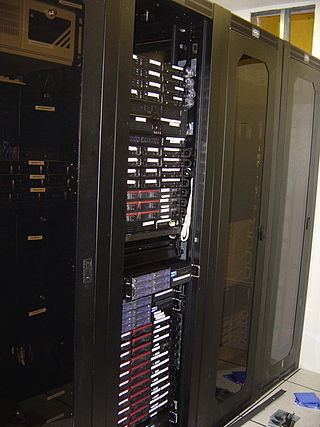
A server farm or server cluster is a collection of computer servers, usually maintained by an organization to supply server functionality far beyond the capability of a single machine. They often consist of thousands of computers which require a large amount of power to run and to keep cool. At the optimum performance level, a server farm has enormous financial and environmental costs. They often include backup servers that can take over the functions of primary servers that may fail. Server farms are typically collocated with the network switches and/or routers that enable communication between different parts of the cluster and the cluster's users. Server "farmers" typically mount computers, routers, power supplies and related electronics on 19-inch racks in a server room or data center.

MonetDB is an open-source column-oriented relational database management system (RDBMS) originally developed at the Centrum Wiskunde & Informatica (CWI) in the Netherlands. It is designed to provide high performance on complex queries against large databases, such as combining tables with hundreds of columns and millions of rows. MonetDB has been applied in high-performance applications for online analytical processing, data mining, geographic information system (GIS), Resource Description Framework (RDF), text retrieval and sequence alignment processing.

In computing, a benchmark is the act of running a computer program, a set of programs, or other operations, in order to assess the relative performance of an object, normally by running a number of standard tests and trials against it.
Online transaction processing (OLTP) is a type of database system used in transaction-oriented applications, such as many operational systems. "Online" refers to that such systems are expected to respond to user requests and process them in real-time. The term is contrasted with online analytical processing (OLAP) which instead focuses on data analysis.
A column-oriented DBMS or columnar DBMS is a database management system (DBMS) that stores data tables by column rather than by row. Benefits include more efficient access to data when only querying a subset of columns, and more options for data compression. However, they are typically less efficient for inserting new data.

Oracle Linux is a Linux distribution packaged and freely distributed by Oracle, available partially under the GNU General Public License since late 2006. It is compiled from Red Hat Enterprise Linux (RHEL) source code, replacing Red Hat branding with Oracle's. It is also used by Oracle Cloud and Oracle Engineered Systems such as Oracle Exadata and others.
In computing, the term data warehouse appliance (DWA) was coined by Foster Hinshaw for a computer architecture for data warehouses (DW) specifically marketed for big data analysis and discovery that is simple to use and has a high performance for the workload. A DWA includes an integrated set of servers, storage, operating systems, and databases.

Exasol is an analytics database management software company. Its product is called Exasol, an in-memory, column-oriented, relational database management system

Michael Ralph Stonebraker is a computer scientist specializing in database systems. Through a series of academic prototypes and commercial startups, Stonebraker's research and products are central to many relational databases. He is also the founder of many database companies, including Ingres Corporation, Illustra, Paradigm4, StreamBase Systems, Tamr, Vertica and VoltDB, and served as chief technical officer of Informix. For his contributions to database research, Stonebraker received the 2014 Turing Award, often described as "the Nobel Prize for computing."
ParAccel, Inc. was a California-based software company.

Chandrasekaran Mohan is an Indian-born American computer scientist. He was born on 3 August 1955 in Tamil Nadu, India. After growing up there and finishing his undergraduate studies in Chennai, he moved to the United States in 1977 for graduate studies, naturalizing in 2007. In June 2020, he retired from being an IBM Fellow at the IBM Almaden Research Center after working at IBM Research for 38.5 years. Currently, he is a visiting professor at China's Tsinghua University. He is also an Honorary Advisor at the Tamil Nadu e-Governance Agency (TNeGA) in Chennai and an advisor at the Kerala Blockchain Academy in Kerala.
In transaction processing, the Telecommunication Application Transaction Processing Benchmark (TATP) is a benchmark designed to measure the performance of in-memory database transaction systems.
RPE2, or Relative server Performance Estimate 2, is a computer benchmark developed by Ideas International to compare the relative performance of servers built on x86, IA-64, and RISC processor architectures.
H-Store is an experimental database management system (DBMS). It was designed for online transaction processing applications. H-Store was developed by a team at Brown University, Carnegie Mellon University, the Massachusetts Institute of Technology, and Yale University in 2007 by researchers Michael Stonebraker, Sam Madden, Andy Pavlo and Daniel Abadi.
eXtremeDB is a high-performance, low-latency, ACID-compliant embedded database management system using an in-memory database system (IMDS) architecture and designed to be linked into C/C++ based programs. It works on Windows, Linux, and other real-time and embedded operating systems.

Actian Vector is an SQL relational database management system designed for high performance in analytical database applications. It published record breaking results on the Transaction Processing Performance Council's TPC-H benchmark for database sizes of 100 GB, 300 GB, 1 TB and 3 TB on non-clustered hardware.
Hybrid transaction/analytical processing (HTAP) is a term created by Gartner Inc., an information technology research and advisory company, in its early 2014 research report Hybrid Transaction/Analytical Processing Will Foster Opportunities for Dramatic Business Innovation. As defined by Gartner:
Hybrid transaction/analytical processing (HTAP) is an emerging application architecture that "breaks the wall" between transaction processing and analytics. It enables more informed and "in business real time" decision making.
The Yahoo! Cloud Serving Benchmark (YCSB) is an open-source specification and program suite for evaluating retrieval and maintenance capabilities of computer programs. It is often used to compare the relative performance of NoSQL database management systems.

TPC-C, short for Transaction Processing Performance Council Benchmark C, is a benchmark used to compare the performance of online transaction processing (OLTP) systems. This industry standard was published in August 1992, and eventually replaced the earlier TPC-A, which was declared obsolete in 1995. It has undergone a number of changes to keep it relevant as computer performance grew by several orders of magnitude, with the current version as of 2021, 5.11, released in 2010. In 2006, a newer OLTP benchmark was added to the suite, TPC-E, but TPC-C remains in widespread use.
Tim Kraska is a German computer scientist specializing in data systems and the intersection of systems and machine learning. He is currently an associate professor of computer science at the Massachusetts Institute of Technology.








